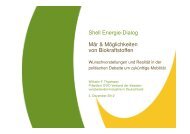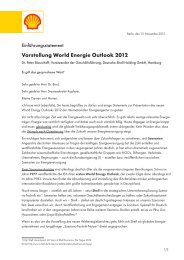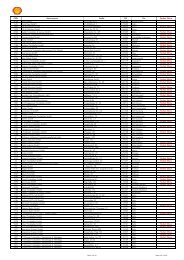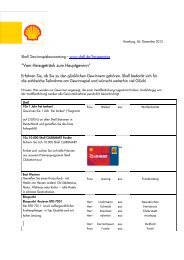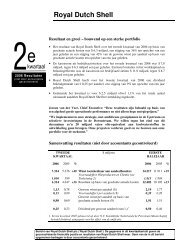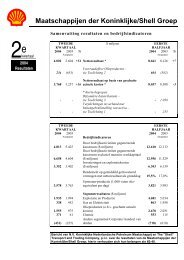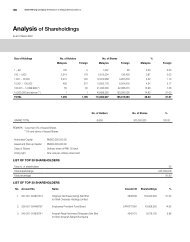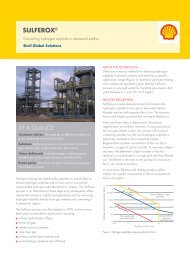62414 sustain 40pp (Mag)
62414 sustain 40pp (Mag)
62414 sustain 40pp (Mag)
Create successful ePaper yourself
Turn your PDF publications into a flip-book with our unique Google optimized e-Paper software.
Millennium<br />
Development Goals<br />
In 2000, the United Nations set its Millennium<br />
Development Goals (MDGs). These are eight<br />
targets to be achieved by 2015, including halving<br />
extreme poverty, reversing the spread of<br />
HIV/AIDS and ensuring environmental<br />
<strong>sustain</strong>ability. Achieving these goals depends<br />
primarily on governments, since reducing poverty<br />
depends on effective public institutions that allow<br />
businesses to create jobs and wealth.<br />
We support the MDGs. Our biggest contribution<br />
by far is providing the modern energy needed for<br />
economic and social development. Getting<br />
electricity to the almost 1.6 billion people who also<br />
currently live without it is particularly important.<br />
Through our operations, we generate local jobs,<br />
contracts and revenues for governments in 50% of<br />
the world’s 50 poorest countries. We also help via<br />
the independent Shell Foundation (see box) and<br />
through our own social investment programmes.<br />
These include taking action on HIV/AIDS for<br />
employees, their families and communities with the<br />
Global Business Coalition and combating malaria<br />
near our operations in The Philippines (see below).<br />
VOICES “ ”<br />
BEATING THE BUG: MALARIA IN THE PHILIPPINES<br />
Near our Malampaya gas project, Shell<br />
Philippines and Pilipinas Shell Foundation<br />
are working with local government and<br />
communities to eradicate malaria from<br />
one of the worst-affected areas of The<br />
Philippines. Results from the programme have<br />
been dramatic. Deaths from the disease<br />
dropped from 85 in 2000 to 20 in 2006.<br />
Part of the success came from applying the<br />
problem-solving skills we routinely use at<br />
work. When we drill for gas, knowing where<br />
not to go often shows us where we should<br />
drill. The same was true here. Instead of<br />
trying to wipe out mosquitoes, the focus was<br />
on keeping them off people – especially at<br />
night – and providing quick treatment if<br />
people developed symptoms. The<br />
programme gave bed nets to families in<br />
high-risk areas and ensured that every<br />
village had a microscope and healthcare<br />
workers trained to use it. People now no<br />
longer need to travel for days to get accurate<br />
diagnosis and treatment.<br />
Ding Roco<br />
SHELL PHILIPPINES<br />
Shell Foundation is an independent charity,<br />
established in 2000 with an endowment of<br />
$250 million from Shell. It aims to find and<br />
develop <strong>sustain</strong>able solutions to poverty,<br />
energy and environment-related problems.<br />
Putting Africa’s entrepreneurs first<br />
In 2004, the Foundation gave a small<br />
Ugandan dried fruit company seed-capital<br />
for computers and training, and helped it get<br />
financing from a local bank to build a new<br />
factory. Two years on, hundreds of jobs have<br />
been created and the company is selling its<br />
fruit in more than 700 supermarket stores<br />
in the UK.<br />
The Foundation is investing more than $50<br />
million to help other African entrepreneurs<br />
creating both financial returns and muchneeded<br />
jobs.<br />
This is an example of the Foundation’s<br />
“enterprise”-based approach – developing<br />
solutions that can quickly finance themselves<br />
and be easily copied by others so they spread.<br />
The Foundation applies this approach<br />
because it thinks too many programmes in<br />
the developing world are reliant on the next<br />
aid cheque, which often does not arrive. So,<br />
unlike most corporate foundations, it does<br />
not hand out cheques to good causes.<br />
Instead, it acts like an investor, looking for<br />
solutions that can deliver both financial and<br />
social returns.<br />
If organisations struggle to become selffinancing,<br />
the Foundation helps by providing<br />
business know-how, discipline and skills<br />
training. This is delivered by business experts<br />
including, sometimes, Shell company staff.<br />
Traffic congestion and pollution<br />
The Foundation is working to reduce the<br />
traffic congestion and pollution plaguing<br />
mega-cities such as Istanbul, Hanoi and<br />
Shanghai. In Mexico City, it helped<br />
Shell Foundation supported Metrobus.<br />
Shell Foundation: enterprise solutions to poverty<br />
implement Metrobus – an innovative route<br />
served by 97 high-capacity buses. Metrobus<br />
carried its 100 millionth passenger after only<br />
18 months in operation. It replaced 350<br />
smaller buses, cut journey times in half and<br />
reduced pollution.<br />
Killer in the kitchen<br />
More than half the world’s population still<br />
cooks on wood, dung and other biomass.<br />
The resulting smoke kills an estimated<br />
1.6 million people a year, making it the<br />
fourth largest cause of death in the<br />
developing world. The Foundation is<br />
applying commercial approaches to tackling<br />
the problem. It hopes to supply 20 million<br />
cooking stoves that reduce dangerous fumes<br />
and use less fuel in the next five years.<br />
Going organic<br />
By providing organic fertilizers and business<br />
support, the Foundation is proving that<br />
developing world cotton farmers can move<br />
from pesticide-intensive production to<br />
organic production despite a daunting threeto-five-year<br />
transition process. Going organic<br />
helps improve soil fertility and water<br />
retention and reduces pollution. It also<br />
guarantees farmers a fair price for their<br />
produce. One farmer, who has made the<br />
transition, said: “The soil is improving, the<br />
environment is better and, through crop<br />
rotation, we are now getting healthier food<br />
for our consumption and our customers”.<br />
In India, more than 900 farmers have gained<br />
organic certification with help from the<br />
programme. Several thousand acres of<br />
organic crops are under production and the<br />
model is expanding rapidly.<br />
Additional web content:<br />
www.shellfoundation.org<br />
THE SHELL SUSTAINABILITY REPORT 2006 29


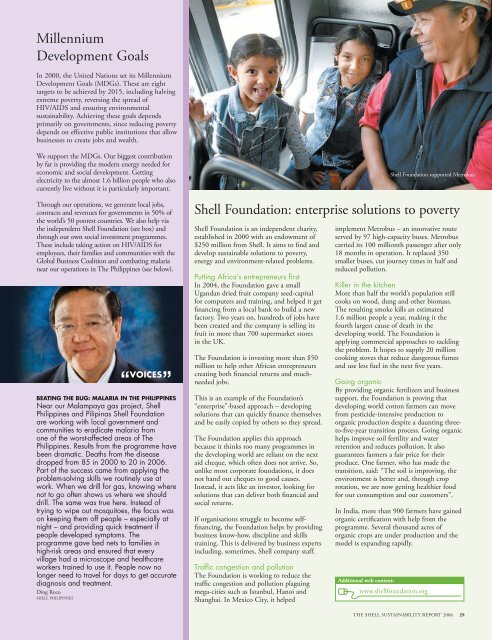
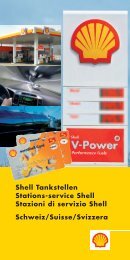
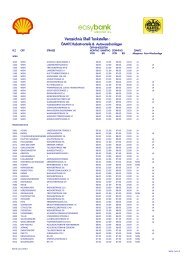
![Download Shell AutoGas Stationen [Stand: Januar 2013] (PDF](https://img.yumpu.com/9982753/1/190x245/download-shell-autogas-stationen-stand-januar-2013-pdf.jpg?quality=85)
